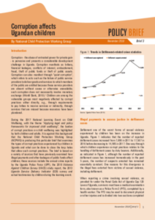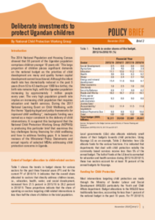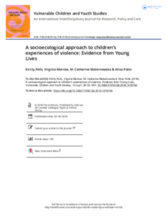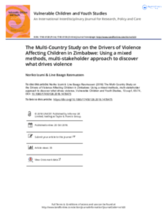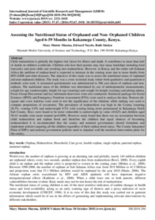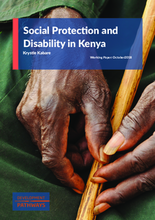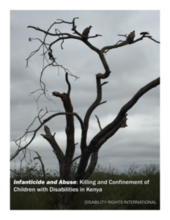Displaying 261 - 270 of 665
This brief from the National Child Protection Working Group (NCPWG) examines the types of corrupt practices experienced by children in Uganda and what can be done to close the loop holes that allow such corrupt practices. The brief highlights the impacts of corruption on children's wellbeing including "instances of falsifying birth histories of children to qualify for orphan status and consequently eligibility for international adoption."
This brief from the National Child Protection Working Group examines the key challenges facing financing for child wellbeing in Uganda and how to address funding gaps.
This chapter examines Global North and South similarities in children and young people’s reactions to school-led child protection programmes.
This paper highlights findings from a a 15-year longitudinal cohort study of children growing up in poverty in Ethiopia, India, Peru and Vietnam.
This article presents an overview of the Multi-Country Study on the Drivers of Violence Affecting Children (VAC) process – including some of the challenges faced and how these were addressed – and a snapshot of the specific findings which helped stakeholders further their understanding about the drivers of VAC in Zimbabwe and what can be done to address them.
The aim of this study was to assess the prevalence of depression and its associated factors among orphans in Ilu Abba Bor Zone orphanages, 2016.
The objective of this study was to assess the nutritional status of orphaned and non-orphaned children in Kenya.
This report provides insights into the current situation in Kenya regarding the inclusivity of social protection for people with disabilities.
This report is the product of a two-year investigation by Disability Rights International (DRI) into institutions and orphanages across Kenya. The report describes the "egregious human rights violations" perpetrated against children with disabilities in Kenya, particularly those who are confined to institutions and "orphanages."
The focus of this article is on children trafficked or migrating alone from rural areas of the Wolaita zone of the Southern Nations, Nationalities, and Peoples’ Region to the urban centres of Jimma or Addis Ababa in Ethiopia.

